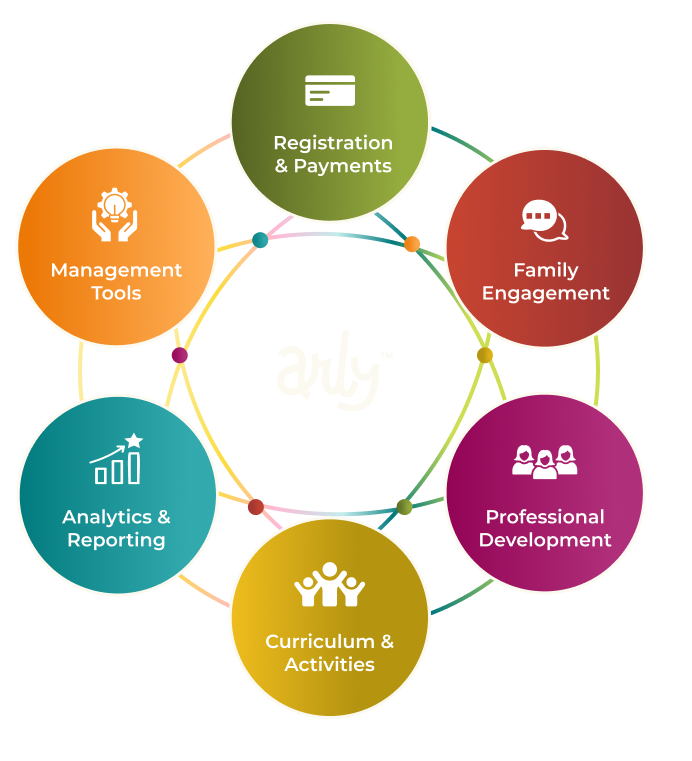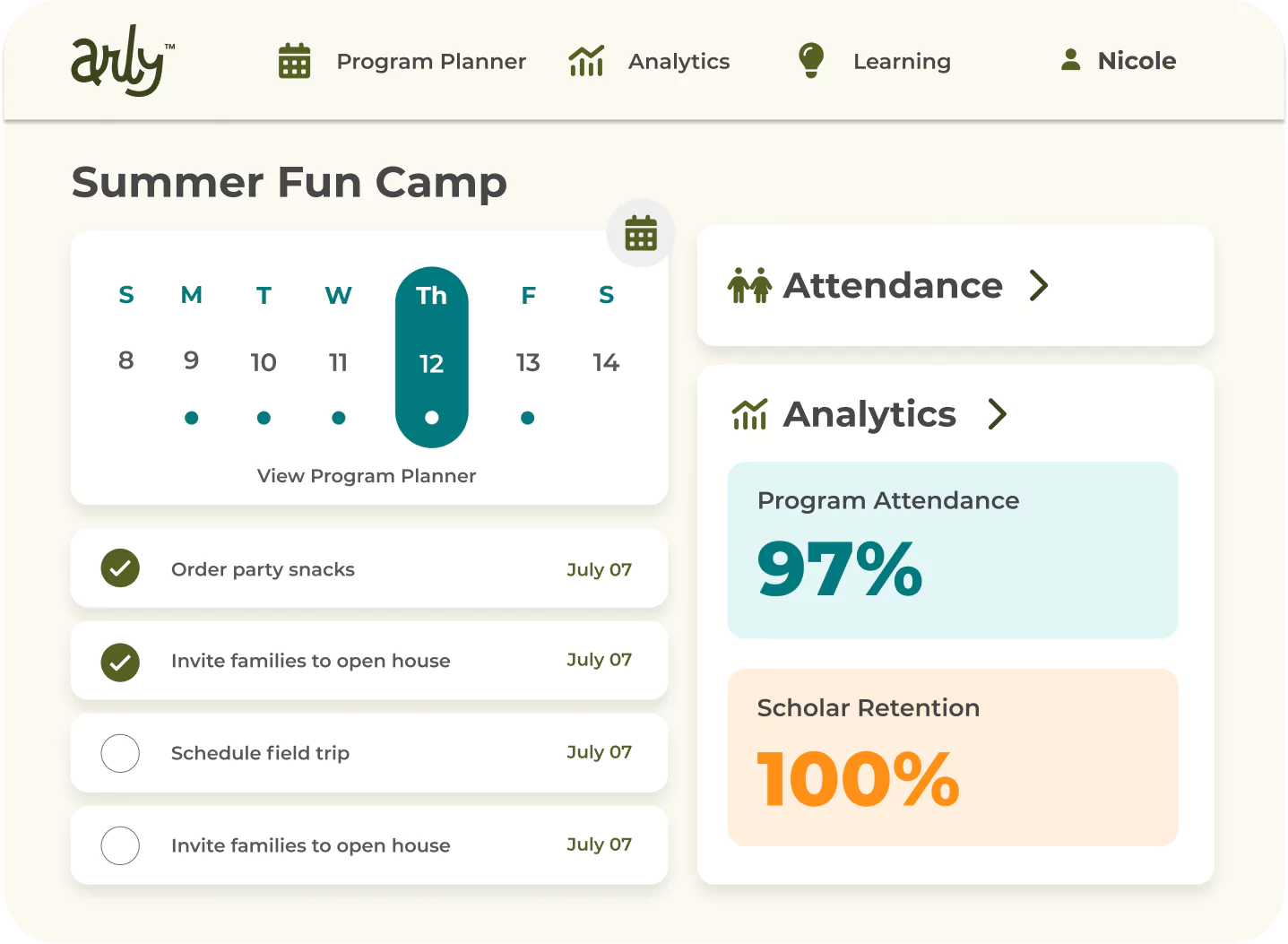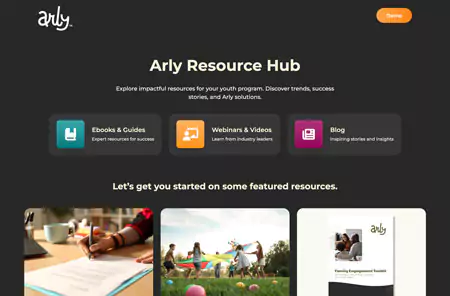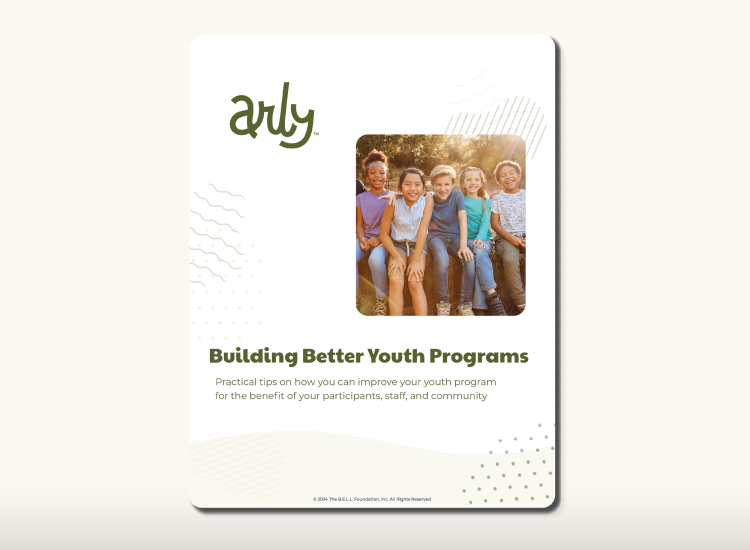5 Keys to a Smooth Day 1 Program Launch
By Arly Communications on June 21, 2023
It’s almost time for your youth program to hit the ground running, and you’re excited to start serving kids and families in your community! You’ve taken time to consider big-picture things like your program’s mission and curriculum, but what about all those pesky details?
Practical program logistics such as how you’ll handle arrival and dismissal or how you’ll keep families in the loop can actually have a major impact on the overall experience for staff and families alike. Let’s look at five important practical considerations to work through in order to set yourself up for success on day one!
1. Iron out your on-site logistics.
With any in-person youth programming, it’s essential that you have a detailed plan in place for on-site logistics like:
- Arrival and dismissal: What procedures do families need to follow for safe dropoff? How will you greet students on day one and on subsequent days? What will dismissal procedures look like? Make sure your staff and your families know exactly how the beginning and the end of the day will run.
- Facility use and cleanup: Who will unlock and lock up the building each day? What janitorial tasks need to be completed each day or each week? Who will be responsible for these tasks? Make sure you have answers to these questions and more so you’re prepared to use your facility properly.
- Contingency plans: What will you do and how will you contact families in the event of inclement weather? How would you handle a power outage? What if a staff member has to call off sick? These sorts of challenges can come up, and you want to be prepared to minimize stress and disruption to your program.
2. Have a system in place for managing data.
Modern youth programming runs on data. Make sure you have a standardized system in place for collecting, storing, and accessing data related to:
- Participants: If you handled enrollment online, then you should have an easy way to keep track of data on your program participants. Now is the time to make sure you collected all the information you need to serve kids and families well. Ensure families have submitted all the necessary forms and see whether there are any clarifying questions you need to ask—for example, if a parent notes an allergy but does not specify what the allergy is.
- Staff: You should also make sure you have all the data on file you need for your staff. If they are paid employees, you’ll need the proper tax forms and bank account information on file.
- Assessments: When you’re focused on getting ready for day one, don’t forget to think ahead about how you’ll assess your program. Consider what types of data you’ll collect and what benchmarks you’re looking to meet. In other words, ask yourself, what does success look like for your program, and how will you know you’re measuring up?
3. Set staff up for success with the right training and preparation.
Get your staff ready to take on your program launch with confidence and competency through a great onboarding program. Onboarding is one of the primary ways you can ensure all of your staff is on the same page when it comes to key areas like your program’s purpose, culture, and policies.
In the weeks before day one, make sure staff are wrapping up their self-paced training modules. Host some on-site training where you cover the details of what day one will look like and go over your program’s specific policies and expectations. This is also a great opportunity to hand out staff T-shirts and start getting excited as a team for the upcoming term.
4. Keep families in the loop so they’re ready for day one.
It’s never too early to start thinking about family engagement. This is an ongoing consideration before, during, and after your program. Use the weeks leading up to the start of the term to keep families informed. For example, you may want to ...
- Have teachers introduce themselves and let parents know they’re looking forward to working with their kids.
- Share a packing list for the first day.
- Remind parents of policies for dropoff, pickup, and transportation.
Even if you’re focusing on housekeeping items, try to promote high levels of enthusiasm in all your communications leading up to day one. Now is the time to set a positive tone for the rest of the year!
5. Stay flexible!
Remember that all the preparation in the world won’t allow you to avoid all hiccups, so you need to remain flexible and be prepared to make decisions and pivot on the fly. Your contingency plans will help, but there may still be unforeseen circumstances or questions that arise.
Encourage staff to take note of any possible gaps or issues they notice in your policies and procedures during the first weeks of the program so you can proactively address them going forward. As you gain experience you’ll gather more information to help your program run smoothly in the future—from day one all the way through to the end of the term.
Get ready to take on day one with confidence and enthusiasm!
Are you ready for a successful day one? With the right planning and the right tools, you can be. Arly helps youth programmers keep everything organized, from staff training and participant data to assessments and beyond. You can greatly simplify the logistics of running your program when you bring all these functions together within a single platform.
Plus, we’re here with a wealth of resources to help you fulfill your mission. Use our downloadable checklist to ensure you’re ready to go for day one!






%20(39).png)

%20(75).png)
%20(43).png)
